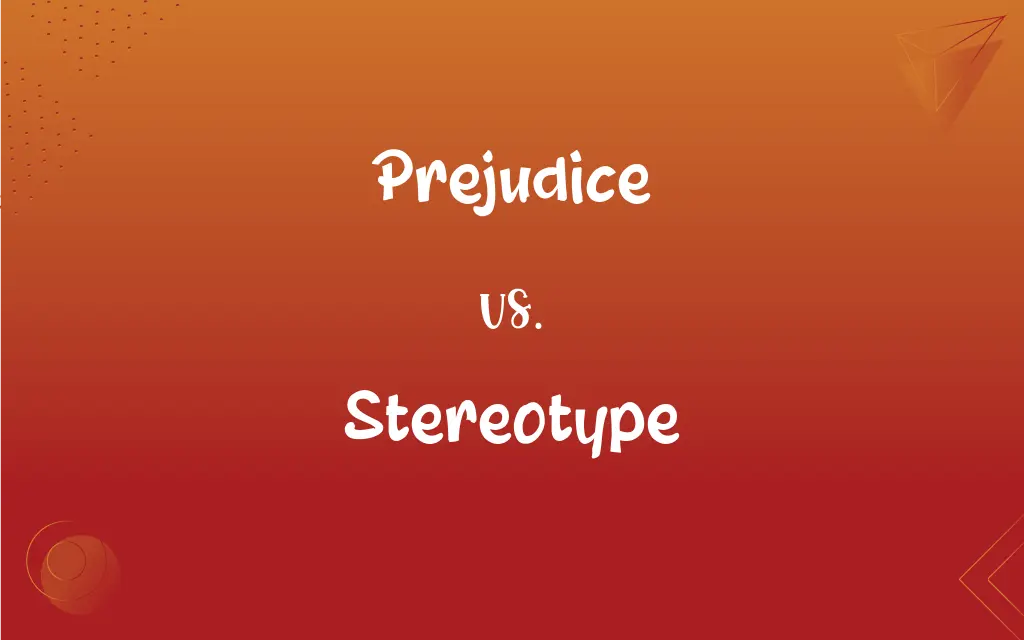Prejudice vs. Stereotype: What's the Difference?
Edited by Aimie Carlson || By Harlon Moss || Updated on October 5, 2023
Prejudice is a preconceived opinion not based on reason or experience, while a stereotype is a widely held but fixed and oversimplified image or idea of a particular type of person or thing.

Key Differences
Prejudice typically manifests as an unfounded or biased feeling or opinion towards a person or group. The conception of prejudice holds that it’s a preconceived and typically unfavorable impression that is not grounded in actual experience or rational analysis. Stereotype, on the other hand, takes this concept to a somewhat generalized level, being a fixed, over generalized belief about a particular group or class of people.
A line of thought about prejudice is that it involves internal feelings, thoughts, or beliefs that one may harbor towards others without necessarily expressing them overtly. Stereotype, however, often finds its expression in generalized statements or beliefs that people may vocalize or use as a basis for prejudiced actions or behaviors.
Addressing prejudice is often considered a matter of addressing internal beliefs and biases to facilitate personal growth and understanding. Conversely, addressing stereotypes may involve dismantling broadly accepted beliefs and challenging communal or societal norms to mitigate their application and impact.
Prejudice frequently generates from ingrained beliefs or emotions and can often give birth to stereotypes. Stereotypes can perpetuate and reinforce prejudiced beliefs, creating a feedback loop that validates and strengthens both prejudice and stereotype, hindering societal development and harmony.
Often, prejudice and stereotype can intertwine, where a person’s internal prejudiced beliefs and externally expressed stereotypes feed into and reinforce each other, complicating attempts to address and dismantle their harmful impacts on individuals and society at large.
ADVERTISEMENT
Comparison Chart
Definition
An unfounded or biased opinion or feeling towards a group.
A generalized belief about a particular group or class of people.
Basis
Personal belief or emotion.
Over-generalized and fixed belief or idea.
Expression
Internally held and may not be expressed.
Often expressed and perpetuated in a society or group.
Causality
Can cause stereotypes.
Can be caused by prejudice.
Addressing Method
Typically involves personal reflection and understanding.
Often involves challenging societal beliefs and norms.
ADVERTISEMENT
Prejudice and Stereotype Definitions
Prejudice
Prejudice involves harboring bias without requisite facts or experiences.
She was unaware of how her prejudice towards young people shaped her reactions.
Stereotype
Stereotype is a widely accepted but unfounded belief about a group.
The stereotype that all politicians are deceitful is commonly encountered.
Prejudice
Prejudice often springs from unwarranted attitudes or beliefs.
Blind prejudice can undermine community relations and harmony.
Stereotype
Stereotype involves generalized perceptions about particular demographics.
Cultural stereotypes often inhibit genuine intercultural understanding.
Prejudice
Prejudice can be an anticipatory opinion or bias.
His prejudice against technology made him wary of advancements.
Stereotype
Stereotype is an unvaried idea replicated across members of a group.
The stereotype that elderly people can't understand technology is widely circulated.
Prejudice
Prejudice is a preconceived, typically negative, judgement or opinion.
His actions were influenced by his prejudice against outsiders.
Stereotype
Stereotype is an oversimplified and fixed conception about a category of people.
Stereotype about gender roles can restrict personal and professional opportunities.
Prejudice
Prejudice is an irrational dislike based on perceptions.
Prejudice towards different cultures prevents global understanding.
Stereotype
Stereotype generalizes characteristics to all members of a group.
The stereotype of the absent-minded professor persists in popular culture.
Prejudice
The act or state of holding unreasonable preconceived judgments or convictions
“This is not actually a volume of the best short stories … These are just the stories that I like best, and I am full of prejudice and strong opinions” (Ann Patchett).
Stereotype
A conventional, formulaic, and oversimplified conception, opinion, or image.
Prejudice
An adverse judgment or opinion formed unfairly or without knowledge of the facts
A boy with a prejudice against unfamiliar foods.
Stereotype
One that is regarded as embodying or conforming to a set image or type.
Prejudice
Irrational suspicion or hatred of a particular social group, such as a race or the adherents of a religion.
Stereotype
(Printing) A metal printing plate cast from a matrix molded from a raised printing surface, such as type.
FAQs
How is stereotype defined?
A stereotype is a generalized belief or assumption about a particular group of people, often simplifying or exaggerating their characteristics.
Can prejudice be positive?
Yes, prejudice can be positive or negative, though it often refers to negative biases due to the problematic impact they have.
Can stereotypes be positive?
Stereotypes, even if seemingly positive, can still be harmful as they restrict individuals to certain expected behaviors or characteristics.
What is prejudice?
Prejudice refers to a preconceived opinion or bias towards a person or group without adequate information or experience.
What is an example of prejudice?
An example of prejudice might be disliking someone solely based on their religious beliefs without knowing them personally.
Could you provide an example of a stereotype?
An example of a stereotype might be assuming that all Americans are extroverted and loud.
Can prejudice impact mental health?
Yes, experiencing or internalizing prejudice can negatively impact mental health by creating stress, anxiety, and diminishing self-esteem.
Can stereotypes be accurate?
While stereotypes might have roots in observed behaviors or traits, they are oversimplifications and are not universally applicable to all individuals of a group.
How do stereotypes influence social interactions?
Stereotypes can shape expectations, behaviors, and interactions within and across social groups, potentially fostering misunderstanding and bias.
How can one overcome personal prejudice?
Overcoming prejudice often involves self-reflection, open-mindedness, exposure to diverse perspectives, and consciously challenging one’s own biases.
Can challenging stereotypes influence societal change?
Yes, by challenging stereotypes, societies can facilitate change by disrupting established norms and encouraging more nuanced understandings of diverse groups.
Is it possible to be entirely free of prejudice and stereotypes?
Completely eradicating prejudice and stereotypes is challenging due to human cognitive tendencies to categorize, but they can be recognized and actively mitigated.
Why is it important to address prejudice?
Addressing prejudice is crucial for fostering fairness, equality, and harmony in diverse societies and preventing discrimination and bias.
Why should stereotypes be challenged?
Challenging stereotypes is vital for ensuring that individuals are treated as unique entities and not judged or limited by generalized beliefs.
What is the role of media in propagating stereotypes?
Media often perpetuates stereotypes by reinforcing generalized beliefs and presenting them as accurate representations through various platforms.
How can education play a role in reducing prejudice and stereotypes?
Education can expose individuals to varied perspectives, promote critical thinking, and encourage understanding and acceptance, reducing reliance on prejudice and stereotypes.
How does prejudice form?
Prejudice can form from various sources like personal experiences, societal influences, upbringing, or exposure to certain beliefs or norms.
What contributes to the formation of stereotypes?
Stereotypes often form from generalized experiences, societal narratives, cultural stories, media portrayals, and human tendency to categorize.
What role does prejudice play in discrimination?
Prejudice can fuel discrimination by justifying unfair treatment and bias towards certain individuals or groups based on preconceived notions.
Are prejudice and stereotype conscious behaviors?
Not always. Prejudice and stereotype can both be explicit (conscious) and implicit (unconscious), influencing behavior without one's awareness.
About Author
Written by
Harlon MossHarlon is a seasoned quality moderator and accomplished content writer for Difference Wiki. An alumnus of the prestigious University of California, he earned his degree in Computer Science. Leveraging his academic background, Harlon brings a meticulous and informed perspective to his work, ensuring content accuracy and excellence.
Edited by
Aimie CarlsonAimie Carlson, holding a master's degree in English literature, is a fervent English language enthusiast. She lends her writing talents to Difference Wiki, a prominent website that specializes in comparisons, offering readers insightful analyses that both captivate and inform.































































